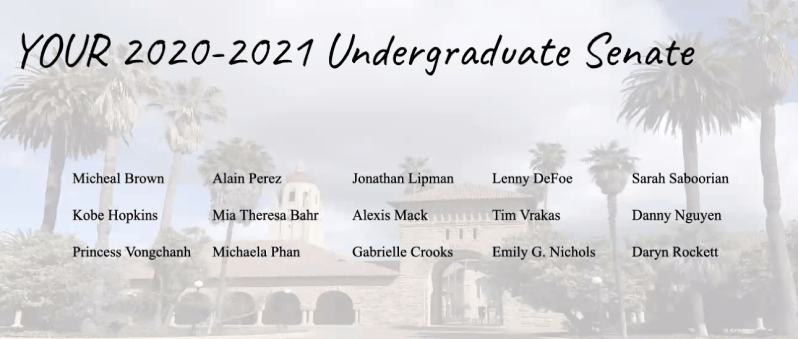[ubergrid id=1168359]
In a 31-way race, all six incumbents running for reelection retained their seats in the Undergraduate Senate, the Associated Students of Stanford University (ASSU) undergraduate legislative body. The proportion of first-year students also dropped, as frosh won six of the 15 seats, in sharp contrast to last year, when frosh took 11 seats.
Reelected incumbents include the members of the Re-Elect Senators Who Care slate: Mià Bahr ’22, Micheal Brown ’21, Kobe Hopkins ’22, Jonathan Lipman ’21 and Tim Vrakas ’21. The slate ran on a platform of “tangible and specific things we’ve accomplished,” citing legislation passed to provide emergency support during COVID-19, support sexual violence survivors, implement educational reform, support voluntary student organizations and bolster mental health resources on campus.
The Stanford College Republicans (SCR) Facebook page posted past anti-Israel tweets authored by Bahr as she sought reelection. Bahr later issued written apologies to Stanford’s Jewish community and the University community.
Incumbent Sarah Saboorian ’22 won reelection but was not included in the slate. The willingness and success of incumbents to run again breaks a long-running trend of low retention of Senate members. Danny Nguyen ’22, who serves as Undergraduate Senate secretary, also won a seat.
The People’s Caucus — Brown, Hopkins, Gabby Crooks ’23, Lenny Defoe ’21, Alexis Mack ’22, Emily Nichols ’23, Alain Perez ’23, Michaela Phan ’23, Daryn Rockett ’23 and Princess Vongchanh ’22 — registered a resounding win on Friday night, with all 10 students winning seats. The People’s Caucus ran for Senate on a platform focused on social change and the safety of marginalized groups on campus.
A town hall hosted by The People’s Caucus on Saturday was Zoom-bombed, with several unknown participants hurling anti-Black hate speech and broadcasting violent and anti-Semitic images at the candidates.
The frosh who won election — Rockett, Phan, Crooks, Perez, Nichols and Vongchanh — boasted a diversity of past leadership experience, including Frosh Council membership, student activism, club leadership and involvement in the Senate’s Associate Program.
Mack and DeFoe reported involvement in community organizations. Mack ran on a platform of amplifying the “roar of marginalized communities,” pointing to past involvement with the Black community and the first-generation and/or low-income (FLI) community on campus. DeFoe is a current executive for Black and Queer at Stanford (BlaQs).
The online nature of the quarter pushed candidates to get creative when campaigning for Senate. Students held town halls and rallies over Zoom, reached out to individual students over social media direct messages and utilized mass email lists. Some students raised concerns that the elections would become a “popularity contest.”
This article has been corrected to reflect that Saboorian is a rising junior, not a rising senior, as a previous version of the article incorrectly stated. The Daily regrets this error.
